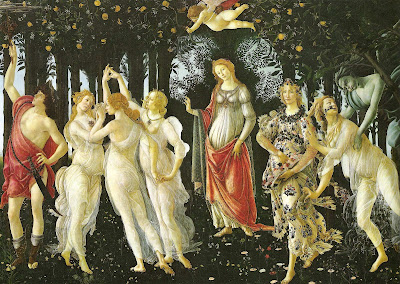"O Mistress Mine"
[A note to our younger readers:
The term mistress
here appears, of course, in its Elizabethan sense,
with none of the contemporary shady connotations:
it is closer to m’lady
or damsel than to concubine
or kept woman.
Mistress is
cognate with master, and retains that
sense
in phrases like “mistress of the situation”
or “the moon is a harsh mistress.”
Indeed, to the extent that any prior or prospective intimacy
is implied,
this inheres in the possessive pronoun,
and not in the noun.
Nay further:
not in the mere pronoun as such,
since there is no such connotation in “my lord”, “my good
sir”, or “my dear fellow”;
rather, in the expressive post-position of same.
For a glance at a similarly old and honorable word,
click here: gentleman.]
http://www.youtube.com/watch?v=aNAHkcMCtIU&feature=related
Sprightly, with a soaring soprano, almost beyond the auditory range.
(Fast-forward past the jugglery tomfoolery at the end,
and you will be rewarded with an instrumentally extraordinarily serious and deliberate performance,
by older, seasoned players (including Julian Bream)
and a beautiful baritone who understands everything
about love and the ladies ...)
Sprightly, with a soaring soprano, almost beyond the auditory range.
(Fast-forward past the jugglery tomfoolery at the end,
and you will be rewarded with an instrumentally extraordinarily serious and deliberate performance,
by older, seasoned players (including Julian Bream)
and a beautiful baritone who understands everything
about love and the ladies ...)
[Update]
Re-watching/listening this,
one is struck
by just how superserious
by just how superserious
are all the instrumentalists
(Bream in particular).
It is as if they are performing particularly delicate
brain-surgery,
on (say) the President, or the Pope.
Which in a sense they are.
Attempting, with all diligence, to keep the beautiful
Elizabethan vision alive,
amid the wreck of our
present culture.http://www.youtube.com/watch?v=zVSogD3IvS4&feature=related
This one's by a countertenor, which is inherently weird,
but very much in the Elizabethan spirit.
After all, the actresses were all actors, back then.
Shakespeare would have approved.
Whither away so fleet?
Soft down adorn thy feet
as we in lilies lie,
our love a lullaby.
-- Anon., school of Crashaw
 |
| Gaudeamus, igitur |
The birds and blossoms
avaunt away.
Where was the blue sky,
‘twill all be gray.
Where spread the greensward
cold snow lies white.
As now sweet sunset--
‘twill soon be night.
-- Thomas Campion (previously unpublished; private collection)
 |
| Carpe florem |
Carpe diem, noctem etiam capere
Stay, stay -- let not the call of false cock crowing
'tice thee away, who in my arms
dreamt on
beneath th’ unseeing stars, and
moon unknowing;
Nay, stay; perchance the day may never dawn.
For as the cruèl Sun with harsh hot
beamings
the morning dew to nought dissolveth quite:
so too the daylight striketh blind
our dreamings.
Nay, stay, and pray: Return, O blessèd Night !
-- Richard Crashaw (from manuscript; private holdings of the WDJ library)
~
When thy cheeks’ May shall turn to
Autumn-tide,
the April of thine eyes to grey November,
the ripe June of thy bosom down subside :
then shall we in repose our loves remember.
-- Andrew Marvell (p.c.)
~
Ah! flee ye -- flee we --
to a nunnery --
to a monastery ---
that we might
strip off, flip off
all the filth
of the present predicament,
and hearken only
to the lute
by angels played …
For more to meditate upon:
~
Again a counter-tenor -- but aïe, how lovely!
John Dowland, “Now, oh now, I needs must part”:
Philological note:
needs is here an adverb, equivalent to perforce.
Here are the lyrics, in case the countertenor delivery makes
them hard to understand:



No comments:
Post a Comment